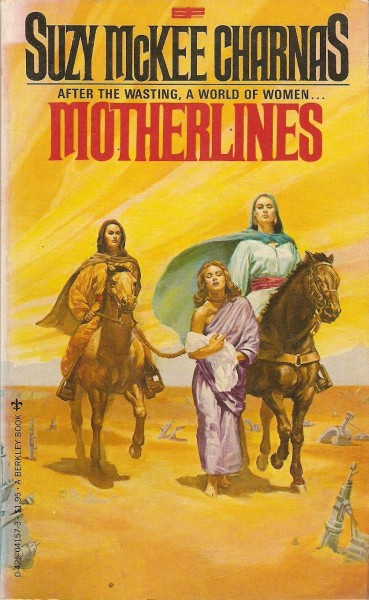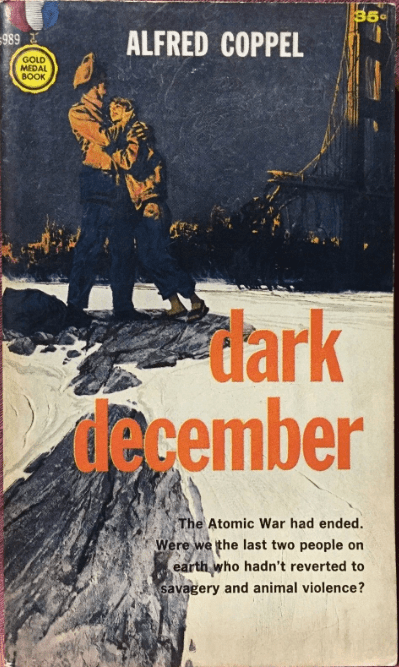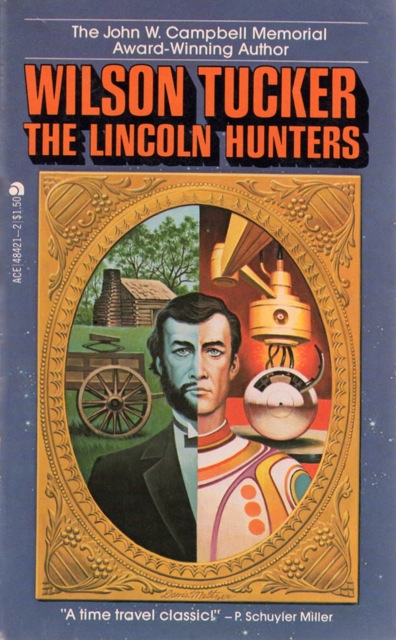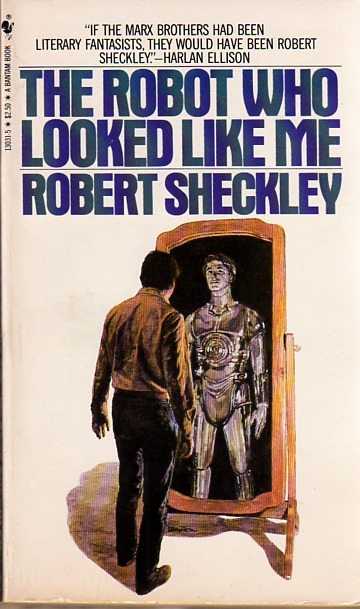September will be a slow month, my apologies in advance. The review backlog grows and grows–reviews of Poul Anderson’s Tau Zero (1970) and The Best SF Stories from New Worlds #2 (1968) should be appearing soon. Although, there are many unreviewed volumes less fresh on my memory…
At least I have a massive review INDEX to keep you all busy.
I am diligently posting all the KWG volumes I snagged from a local Half Price Books—this shadowy person had a spectacular collection.
I am rarely interested in SF series, but, I’ll make an exception as Suzy McKee Charnas’ Walk to the End of the World (1974) was so darn amazing!
More Sheckley!
More Tucker! Fresh off the very satisfying The Long Loud Silence (1952)…
And finally, a novel from an author I’ve never read before—Alfred Coppel.
As always, thoughts/comments are welcome.
1. Motherlines, Suzy McKee Charnas (1978)
(Doug Beekman’s very bland cover for the 1979 edition)
From the back cover: “Alldera had risked her life to escape the Holdfast, where men ruled fems in a bestial society based on fear. She had followed a whisper: the legend of the free fems who lived without masters.
Instead, she had found the Motherline Tribes. The proud Riding Women who bred without men, the dark-laughing warriors who dared her to be free!”
2. Dark December, Alfred Coppel (1960)
(Uncredited cover for the 1960 edition)
From the back cover of the 1970 edition: “After World War III WHEN IT WAS TOO LATE…
Major Kenneth Gavin—one of the few anguished souls left to contemplate the end of biological existence, the silent spring, the dying of love, desire, and hope—was one who had pushed the button that ended everything. One who had nothing left but perception and remorse. One who had killed millions by remote control could kill no more–not even to save himself.”
3. The Lincoln Hunters, Wilson Tucker (1958)
(Davis Meltzer’s cover for the 1977 edition)
From the inside flap: “Ben Steward, man of the 26th century, was a “Character” for Time Researchers: he was an adventurer, an actor, a student of history… a man trained to blend into any era of man’s long past. In the overpopulated, stultifying world of 2578, his was an exciting job.
He had, for example, been standing on the shore with the Indians when the Pilgrims rowed ashore from the Mayflower. And now he had been sent back 700 years into his past, to the political furore just before the Civil War… and he was facing certain death.
For the engineers who operated the time machine had made a mistake, and Steward was stuck in the time which would overlap the time-segment he had already scouted. No person could twice exist in the same time; it was an impossibility. And so Steward, in a few moments, would simply disappear…”
4. The Robot Who Looked Like Me, Robert Sheckley (1978)
(Thompson’s cover for the 1982 edition)
From the back cover: “DOUBLE TROUBLE. What could you accomplish if you could be in two places at once? Charles Watson found out when he had a robot duplicate of himself built, perfect in every detail. But when it took over his love life, things really got interesting.
THE ROBOT WHO LOOKED LIKE ME brings a dozen of Robert Sheckley’s most outrageous flights of fancy together for the first time in paperback. Inside you’ll find a time traveller who multiplied himself into the millions, a beauty who outfoxed a computerized singles service, a man who was loved by inanimate objects, a pair of incredible binoculars, an actor who got caught in a never-ending western movie, and more marvelous madness from science fiction’s wittiest writer. In short, it’s pure, uncut Sheckley, guaranteed to blow you away with laughter.”




A very nice selection of books.They at least all sound worth reading.I don’t really know Alfred Coppel.From what I’ve seen and read of the above book,I assume he’s not a writer of genre science fiction.
What can I say about Bob Sheckley?I’m sure it must be good.He,Ray Bradbury,Alfred Bester and others in the critical 1950s,brought sophistication to science fiction.
Anderson’s “Tau Zero” was included in Davd Pringle’s “Science Ficton:The One Hundred Best Novels”.His piece on It,didn’t make me inclined to read it,but I’ll wait for your review before I say anymore.I haven’t been all that keen on hs stuff,includng the only novel of his I’ve read,”Brain Wave”.
The “New” Worlds anthology should be interesting I think.Hope there’s at a few pieces in there I’ve read.
I thought Tau Zero was profoundly average — which is part of the difficulty in writing my review… It’s easier to write about stuff I loved and stuff I hated!
The Best SF Stories from New Worlds #2 (1968) is a solid volume. Worth tracking down.
I thought you might say that about it.I have to say I’ve preferred Heinlein to Anderson,which I know is saying something,but at least he had greater story telling gifts,despite structural and thematic flaws.
I’m surprised David Pringle chose it for his 100 best list,if it’s as bad as you say it is.He could have chosen a much better book.
Have you any favourites in “New Worlds #2?
I understand why people like Tau Zero and why Pringle put it on his list. It’s hard SF that fails, but tries, to get at the psychology of its characters. I find it little surprise when fans of Hard SF complain about not wanting any “interpersonal relationships to get in the way of the science” because the majority of the proponents of the form are virtually incapable of writing interpersonal relationships (they tend to be sappy excuses to titillate 14 year-old boys).
Yes,I can understand why he put it on his list too.As he said about Asimov,he had no enthusiasm for his work,but one to include at least one of his novels,because he was the world’s most famous science fiction author.The same reasoning applies to Anderson of course.He had to be representitive in his choices.It was difficult however for the same reasons,to chose the best wthin the limits of a hundred novels.He admitted himself that unfortunate omissions had to be made.
I am perplexed by what is called “Hard scence fiction” in the modern genre.Of course,I respect the fact that there are such books,and several if not many of them,are classics,but are you talking about fans of just generic science fiction?There have been so many changes within the written genre since the early 1950s through to the 1960s “new wave” and beyond,from which famous authors such as Ray Bradbury,Ted Sturgeon,Ursula LeGuin and Bob Silverberg have emerged.Silverberg is probably one of the best authors who have combined traditional science fiction tropes with softer concepts that compliment each other.His stuff also succeeds because it has a literary elegance,that much “Hard science fiction” lacks.
I’m not being definite about this,and is meant to be subjective,but I’m just quibbling with what “Hard science fiction” is in modern science fiction.It includes social,political and psychological themes,that are just as important.I don’t have definite rules that conform to generic standards.
I am certainly no fan of what others classify as “hard SF” so I am probably not the one to ask. But, Tau Zero is considered an important member of that subgenre…
Yes, I love Silverberg. As you know!
That’s alright then,you don’t have to agree or disagree.It is a bit vexing though,that so many fans should view what is a mixed and individual genre,in such plain,generic terms.
Yes I do know you like Slverberg,and for the same reasons I do I think.I haven’t read enough of his stuff enough.
I finally reviewed Coppel’s Dark December (1960) — worth tracking down!
Yes,I’ve just seen and read it.
Cool!
Hi Joachim
An interesting group. I was out book shopping with a friend yesterday and among the books I hauled home were the The Robot Who Looked Like Me and The Lincoln Hunters so I will be interested in reading your comments later if you review them.
Happy Reading
Guy
Thanks Guy for the comment. One can never go wrong with Sheckley collections!
The Lincoln Hunters is one of my favorite books from the 1950s, and one of Tucker’s best efforts. He’s one of those authors that I wish had done more writing, such as Edmondson and Ken Grimwood. I grew disenchanted with Dark December as Gavin’s character became fully revealed. Sheckley is nearly always above average, though he does seem to beat some themes to death. Charnas’ Walk didn’t live up to the title as the gender dichotomy was flogged to death with a feminist slant.
“Charnas’ Walk didn’t live up to the title as the gender dichotomy was flogged to death with a feminist slant.”
“Feminist slant.” You mean, it has a feminist polemical point taken to an extreme? I thought the entire point of dystopia was to put concepts in hyperbolic extremes? You are certainly talking to the wrong reader if you think I am bothered by “feminist slants.” Male authors from across the political spectrum seem to get away with their “political slants.” Heinlein comes to mind, John Brunner, Norman Spinrad, among others. As for “flogged to death” — yeah, sounds like almost all dystopic SF works I have ever read! Pollution wrecks the world (Brunner’s The Sheep Look Up)! Overpopulation wrecks the world (Brunner’s Stand on Zanzibar)! Etc. Etc.
Here’s a link to my review.
https://sciencefictionruminations.wordpress.com/2015/07/30/book-review-walk-to-the-end-of-the-world-suzy-mckee-charnas-1974/
Joachim:
Since my simple assessment of Charnas seems to have upset you, let me give you a brief explanation: I’m one of those people that think the 50s was the golden age of science fiction. My primary reason for reading is solely entertainment. I like a book or not and usually categorize this fact with a general note, as I did re: Charnas. That was my simple gut feeling after reading the book. I don’t always agree with your views, but I respect them and that is the primary reason I visit your website because you take the time to compile the merits/shortcomings in structured book reviews. I infer from your ratings that you, too, find some books less than enjoyable.
Not angry/upset, but fiery/passionate!
I read stuff like Charnas for entertainment. One of the joys of SF is its ability to push premises to their extremes. Dystopia in a nutshell. And of course, tons of 50s SF falls into this pattern as well… So, that comment also confuses me. Mordecai Roshwald’s Level 7 (1959), A Canticle for Leibowitz (1959), Heinlein’s juveniles (how many Libertarian-esque be a self-made man and strive for the stars narratives are out there?), any of the satires of Kornbluth, etc etc etc. They are all stridently polemical in their own ways. I think we look past a lot of the polemicism of 50s SF.
By the way, I just reviewed and enjoyed Tucker’s The Long Loud Silence (1952) — > https://sciencefictionruminations.wordpress.com/2016/08/17/book-review-the-long-loud-silence-wilson-tucker-1952/
Thank you for the kind words.
I read the Dell edition of The Long Loud Silence and put it in my top post apocalyptic tales from the 50s, too, along with, in no particular order, Mead’s The Bright Phoenix, Anderson’s Vault of the Ages, Bowen’s After the Rain and the classics, Brackett’s The Long Tomorrow, Frank’s Alas, Babylon, Christopher’s No Blade of Grass and Wyndham’s The Day of the Triffids. I also lump Chute’s On the Beach into this category even though it doesn’t strictly qualify. I read Miller’s Canticle in the 70s and again a few years ago, when despite the theme and humor it didn’t fare so well. Ditto Roshwald’s Level 7. I’ve noticed this to be the case when rereading books from the 50s, especially such as the works of Heinlein, which I now find extremely difficult to finish.
A Canticle and Level 7 would be in my top 5 post-apoc books from the 50s. I want more than a plot, I want some satire, a serious theme, some wit, some surreal moments…
Perhaps the effective exploration of the theme of trauma in The Long Loud Silence made it so appealing. And, had a non-traditional anti-hero. And goodness, if Tucker had his way the novel would have been so much darker. The only reason I do not place it in my top 5 is that I read the 1969 rewrite.
I almost added Coppel’s Dark December to that list because it was published in 1949…And from the link on your site, downloaded Wolfe’s Limbo .pdf. I’m halfway through it and would probably add that, too, despite the preaching that both detracts from the flow and explains his views.
Dark December was published in 1960 according to the listing on isfdb.org…
http://www.isfdb.org/cgi-bin/title.cgi?7933
I have not read Limbo yet.
My review of Dark December is up! (and yes, three years later.)
You’re absolutely correct! I should’ve said, Stewart’s Earth Abides, which was published in 1949.
I’m keen to get hold of The Lincoln Hunters. Once again I was alerted to Tucker’s work thanks to your review of The Long Loud Silence. I recently read The Year of the Quiet Sun and found it intriguing, particularly in terms of the psychology of the time travelers.
Thanks for the kind words.
Ah, so you’re a time travel junkie?
I tried to read The Year of the Quiet Sun, and put it back down (not because it was bad but for some reason I wasn’t in the moon). I will try again, I will!
I’m not sure I’m hooked on it, but I do think about time travel a lot. Maybe it’s the historian in me. Wells’ The Time Machine is probably my favourite story of all, mostly for the Travellers final dash into the far far future. But also for the crazy extrapolation of class struggle. My next favourite (or maybe just another fave). I’m not sure. I haven’t dedicated time to making lists like you but perhaps I should. I have a soft spot for Barrington Bayley’s two time travel novels: The Fall of Chronopolis and Collision with Chronos.
I have reviews of both Bayley novels on the site (I was a huge fan a few years ago) — although both reviews are old and not that great. I enjoyed The Fall of Chronopolis more — times nodes and all.
Have you read Poul Anderson’s There Will Be Time (1972)?
https://sciencefictionruminations.wordpress.com/2013/08/16/book-review-there-will-be-time-poul-anderson-1972/
It’s strange I hadn’t already read your reviews of these Bayley novels. I am slowly and haphazardly working my way through your site.
I agree that the Fall of Chronopolis is the superior one. Nonetheless I love the idea of the time waves and the ruins getting younger. Bayley lifted the idea of the time waves from JW Dunne, who wrote a series of books in the first half of the 20th: An Experiment in Time, The Serial Universe, maybe some others. I read the latter two as a result of Bayley. H Beam Piper got there first though, mining Dunne’s ideas for his Paratime stories.
I’m not sure why I dig time travel so much. When it’s done well it’s great, but alas this is so rarely the case. For instance Poul Anderson’s Time Police stories are just ok. Nonetheless I’ve enjoyed other Anderson stories so I’ll track down There Will Be Time. And yep I agree that Tau Zero is just ordinary. Nothing to see here folks!
The reviews are probably clunky and bad (they are quite old), my apologies.
The most recent one I wrote was The Garments of Caean (1976) — and that one is still four years old…
https://sciencefictionruminations.wordpress.com/2012/11/23/book-review-the-garments-of-caean-barrington-j-bayley-1976/
As I point out, Anderson’s story is definitely not a sort of pulp adventure but an attempt (I am not convinced its successful) of a creating character driven examination of the ramifications of time travel. Sort of like his version of Silverberg’s Dying Inside (1972).
Again, not sure how that review escaped me. I’ve read the Garment of Caens twice, with an interval of nearly 20 years between reading. I enjoyed it less the second time around, having being “blown away” by the first.
Bayley is an exceptionally interesting character. As you point out he combines an at times complex and subtle philosophical perspective with a pedestrian prose style and almost non-existent characterisation. I waver over considering the latter two qualities necessarily detrimental though. I often find that too much importance is given to style and characterisation. This is understandable, perhaps, if it is what you seek, or measure the quality of a work by. And of course I am not adverse to style and character…
There was a brief time in my life, say 25 years ago, when I thought Bayley was the bomb. I read most of his novels then, and all of them stuck with me to greater or lesser extents. One I was particularly taken by, probably second only to the Fall of Chronopolis in my reckoning, is The Pillars of Eternity – the novel of your namesake! Perhaps its time to return to its loopy take on the eternal return, an idea I cannot seem to escape no matter how hard I try…
I appear to have missed your response, my apologies. I too thought Bayley was the bomb! My tastes have evolved, and yes, sometimes ideas do rescue a novel but ultimately, a combination of more adept style + ideas is a winning formula. Some of his short stories to try to get more at character, psychological insight into actions, etc. I wish it transferred over his novels.